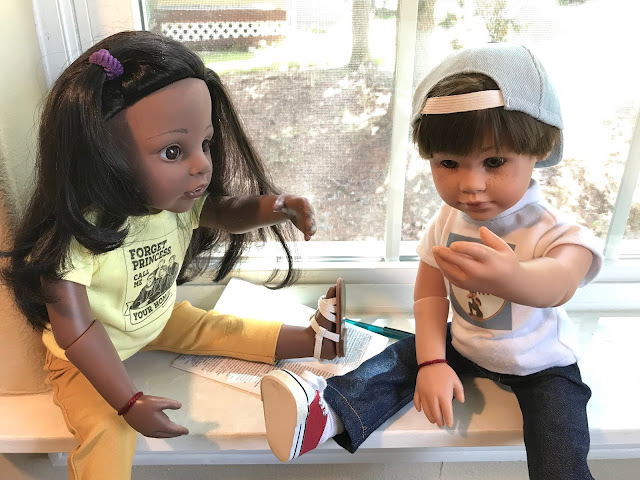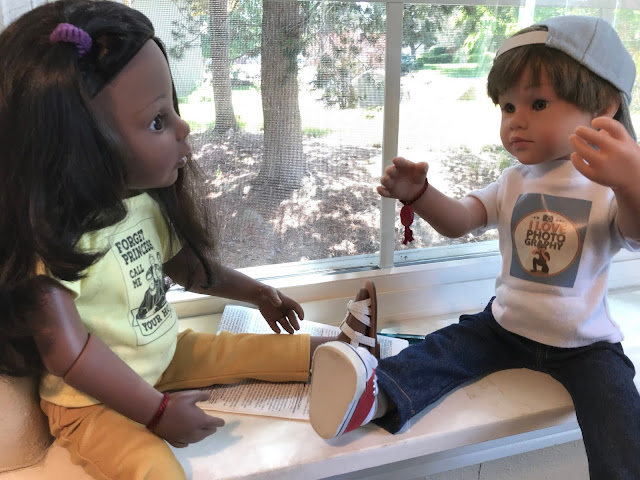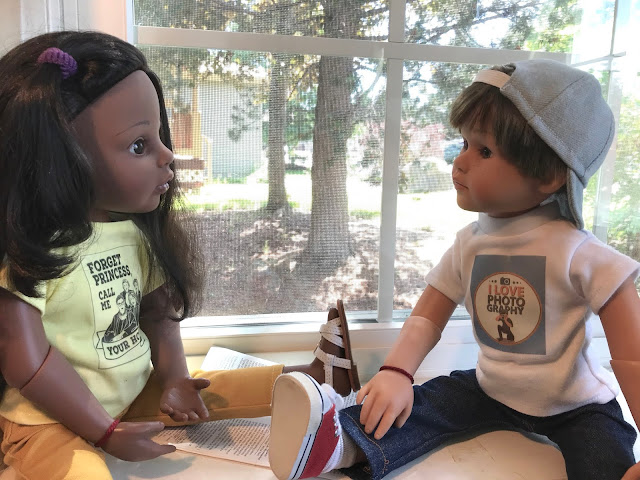"What are you reading?" he asked her.
"I'm not reading, actually," Mariah explained. "I'm going to be in a play at school. This is the script (SKRIPT). That's the play all written down, with the things the characters say and do all explained."
Billy thought that was interesting. "I didn't know you were in the acting class," he said.
"I'm not in the acting class," Mariah replied. "The teacher who is putting on the play came to my class and asked if I would be in it. She said they really needed me and a few other dolls who are not in the class."
"So what are you doing with the script?" Billy asked.
"I'm studying my lines," Mariah explained. "My lines are what I'm supposed to say. It's my part in the play."
"What's the play about?" Billy asked.
Mariah pointed to her papers. "There are some dolls," she said, "who all look like Veronika and Jolena and have all lived in the same place all their lives. They all believe the same things. They are all girls. In the play, they have a problem they are trying to work out, and they can't figure it out."
"Then," Mariah went on, "they start talking with some other dolls, dolls who have different faces or different-colored vinyl, like me, some boys, some dolls who come from different places, and dolls who have different beliefs. They get different ideas from the dolls who are different from them."
Mariah explained that the play shows how important it is to have something called diversity (dih-VERS-ih-tee) when you're trying to figure something out or solve a problem or build something new. "Having diversity means having different kinds of dolls in your group," she said.
"Why did that help with the problem?" Billy asked.
"Well," Mariah began doubtfully, "I think it has to do with seeing things differently or having a different point-of-view. If I could just think of an example...."
She thought about that for a few seconds. "I know!" she cried suddenly. "Look at your hand!" she said.
Billy looked.
"What do you see?" Mariah asked.
"I see some jam I didn't get off when I washed my hands after I pretended to eat lunch," Billy said.
"What else?" Mariah asked.
"I see four fingers and a thumb," Bill said.
"Yes!" Mariah exclaimed. "Those four fingers are very much alike. They all come from the same direction. They are very good at what they do and working together, but even when they work together, there are things they can't do. They are like dolls who are all alike. They are like dolls who all see things the same way."
"It's hard to pick things up with just my fingers," Billy said. "I usually need to use my thumb."
"That's right," Mariah agreed. "Your thumb comes from a different direction. It's able to do different things from the fingers. You have diversity in your hands, because your fingers and thumbs are different from each other. When they work together, they are able to do things they can't do alone."
"There are things that are hard to do with my right hand," Billy said. "I have these two fingers stuck together." Billy held up his right hand for Mariah to see.
"Yes," Mariah agreed. "We all do. It's one of the many ways we're all alike.
"My two hands are different from each other, too" Billy observed.
"Yes," Mariah said, "and they come from different directions, so you can do things with both hands that would be difficult to do with just one."
"It would be hard for me to pick up and use my camera without my thumbs," Billy agreed, "and I need both hands to set it up to take photos."
"Yes," Mariah concluded, "Your fingers and hands are like the dolls in the play. When they were all just alike they couldn't work out the problem. If you have a problem to solve or a project to work on in a group, it's better to have some dolls who are different from you in your group."
"When will the play be?" Billy asked. "I want to come."
"It's at the end of next month," Mariah said. "We have a lot of rehearsing––that's practicing––to do before then. Would you like to help me learn my lines?"
"What do I do?" Billy asked.
Mariah handed him her papers. "My part is underlined," she explained. "You read me what all the other dolls say except what's underlined. I'll say my part, and if I get stuck and can't remember, you prompt me. That means you tell me the beginning of that line to remind me."
"I'll be your thumb," Billy said. "I'll help you do something you can't do by yourself!"
Mariah agreed Billy was indeed being like a thumb. It was going to be much easier for her to learn her lines with Billy's help.
Cast--
Mariah: Götz Happy Kidz Mariah, "Chosen" from My Doll Best Friend
Billy: Götz Happy Kidz Lily at London
Marmalade: Purrrfect Cats from KTL
You can follow The Doll's Storybook here.
Do you have questions or comments for us? Would you like to order an autographed copy of one of our books? You can email us at thedollsstorybook@icloud.com.
Note: No dolls were harmed during production of this blog. All dolls shown are Götz Happy Kidz, Classic Kidz or Little Kidz. If you like these stories and are willing, please make a donation of any amount to St. Jude Children's Research Hospital or any organization that supports pediatric cancer research and treatment. We are not affiliated with St. Jude in any way other than these donations.
"The Doll's Storybook" is not affiliated with Gotz Dolls USA Inc. or Götz Puppenmanufaktur International GmbH.
Watch for the next story each Friday afternoon at 1:00 PM Pacific Time.
<a href="https://www.bloglovin.com/blog/19832501/?claim=j3fj3mbb8kt">Follow my blog with Bloglovin</a>
"The Doll's Storybook" is not affiliated with Gotz Dolls USA Inc. or Götz Puppenmanufaktur International GmbH.
Watch for the next story each Friday afternoon at 1:00 PM Pacific Time.
Do you like our stories? Some of them are available in print:
The stories in More Classic Tales Retold: Stories from The Doll's Storybook are Welcoming a Stranger, The Rescue, Unmasked, Fuzzy Town––A Play and Sky Blue.
Our Favorite Verses: Poems from The Doll's Storybook. Poems included are Valentine's Day, Keeping Pets, Back to School, Victor the Vulture, The Week Before Christmas, Insomnia and Veronika's Vocabulary Verses.
The stories in Classic Tales Retold: Stories from The Doll's Storybook are Little Green Greatcoat, The Boy Doll Who Cried Wolf and Lost in the Woods.
The stories in Emil: Stories from The Doll's Storybook are Best Buds, Getting What You Want, and The Boys Cook Dinner.
The stories in Mariah: Stories from The Doll's Storybook are Being Little, Besties, and Distraction.
Coming soon: Billy: Stories from The Doll's Storybook.
If you don't get free shipping from Amazon or B&N, buy from the BookBabyBookshop, because 50% of the price goes to St. Jude. Other booksellers pay much less, because the vendor gets a cut. My author's page at Book Baby is here. Scroll down and click on any of the books that interest you. Find my books at Barbara's Bookstore as well.
Note: This blog post was produced on the iPad and the MacBook, using the iPhone for some photos and some photo processing. No other computer was used in any stage of composition or posting, and no Windows were opened, waited for, cleaned or broken. No animals or dolls were harmed during the production of this blog post.
Copyright © 2020, 2025 by Peggy Stuart



























Very clever! Clara
ReplyDelete